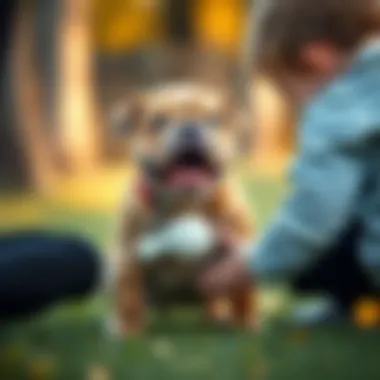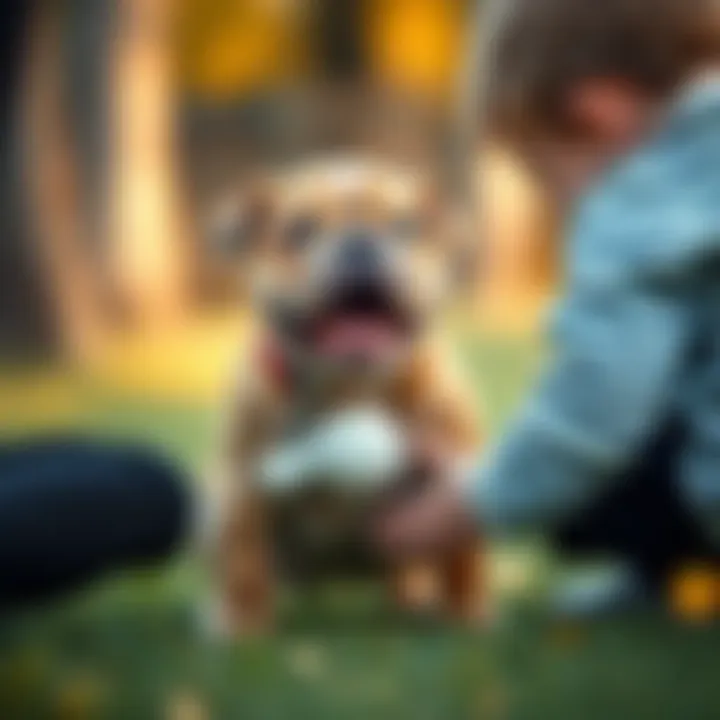The Charm and Care of Bull Dog Puppies Explained


Intro
Bull dog puppies have fascinated many with their unique blend of charm and loyalty. As adorable companions, they often steal the hearts of those who encounter them. This article dives into the multifaceted appeal of these puppies, examining essential care requirements, unique behaviors, and the responsibilities associated with owning such a distinct breed.
With their broad, sturdy frames and characteristic wrinkled faces, bull dog puppies present an allure that captivates aspiring pet owners. However, it's crucial to understand that beyond their welcoming exterior lies the need for patience and commitment. Nurturing these puppies involves comprehending their specific requirements and behavioral traits, which will be discussed in detail.
In this comprehensive guide, we'll unpack everything from nutritional needs to training considerations, ensuring you have a well-rounded perspective on what it takes to care for these lively beings. Thus, whether you're a seasoned dog owner or new to the world of pets, this guide aims to provide you with the insights required to foster a fulfilling relationship with your bull dog puppy.
Pet Care Essentials
With bull dog puppies, proper care is paramount. Let’s explore the pet care essentials that every owner needs to keep in mind.
Daily Nutrition Requirements
When it comes to feeding your bull dog puppy, nutrition plays a vital role in their growth and behavior. Opt for high-quality dog food that meets their specific needs. Puppies usually require food rich in protein to support their growth. The amount per day can vary depending on age, weight, and energy levels. Dividing their meals into three small portions helps maintain energy levels throughout the day.
Exercise and Playtime
Though they might not be the most energetic breed, bull dog puppies need regular exercise to keep them healthy and happy. Short walks and play sessions sprinkled throughout the day are essential. Engage them with games that stimulate their senses. A simple game of fetch or tug-of-war can keep the bond strong, ensuring they lead a well-rounded life.
Grooming Tips
Grooming is another cornerstone of care. Their short coat may seem low-maintenance, but it still requires regular brushing to remove loose hair and debris. Pay attention to their facial folds as well. Cleaning these areas helps prevent skin infections, which can be a concern in this breed.
Health and Wellness Check-ins
Regular health check-ups are vital for bull dog puppies. Schedule visits to your veterinarian for vaccinations, dewormings, and overall health assessments. Early intervention for any health concerns can be the difference between a minor hiccup and a major issue down the line.
"Preventative care is far better than waiting for trouble to knock on your door."
Behavior & Training
Understanding behaviors is key to nurturing a well-adjusted bull dog puppy. Let's arealize some methods and techniques helpful in this journey.
Understanding Your Pet's Body Language
Bull dogs have unique forms of expression. Recognizing when they are excited, nervous, or even bored can enhance communication between you and your puppy. Look for tail wags, ear positions, and facial expressions. Learning to read their body language can lead to more positive interactions.
Basic Training Techniques
Training your puppy from a young age establishes a foundation for respectful behavior. Start with basic commands such as sit, stay, and come. Consistency and positive reinforcement work wonders. Treats or praise for desired actions can make learning fun and effective.
Behavioral Concerns & Solutions
Some bull dog puppies may exhibit stubbornness. It's essential to approach behavioral issues calmly. If a persistent issue arises, consulting a dog behaviorist might be necessary. They can provide tailored solutions based on specific behaviors.
Socialization Tips
Introducing your bull dog puppy to various environments, people, and other animals is crucial to their development. Early socialization helps prevent anxiety and aggressive tendencies down the road. The more diverse experiences they have, the better they can adapt.
Pet Home Environment
Creating a suitable home for your bull dog puppy ensures their safety and comfort. Here are some considerations.
Creating a Pet-friendly Space
Designate a comfortable area in your home as your puppy's zone. Ensure it has bedding, their favorite toys, and easy access to fresh water. A non-slip surface can also prevent accidents as they grow and get accustomed to their surroundings.
Safety Measures and Hazards to Avoid
Ensure that harmful items are stored safely away from your puppy's reach. Common hazards include electrical cords, chemicals, and small objects that can be choked on. Keeping a close eye on them during playtime can prevent mishaps.
Choosing the Right Toys and Accessories
Select toys that are both safe and engaging. Opt for chews that are specifically made for bull dogs. High-quality toys not only entertain but also support dental health by helping to control tartar buildup.
Setting Up a Comfortable Resting Area
A restful space is essential for a bull dog puppy's growth. Beds should be cozy yet supportive to accommodate their joint structure. Consider using a thick, orthopaedic-style bed to promote comfort.
Pet Health Issues
Being informed about potential health risks can make a significant difference in your puppy's life. Here’s how to approach health-related concerns.
Recognizing Signs of Illness
Remain observant of any changes in behavior, appetite, or energy levels. Subtle signs could indicate underlying health problems. If your puppy seems off, early diagnosis can be critical.


Preventative Care Measures
Besides regular vet check-ups, vaccinations and dental care should be considered as indispensable. Take the initiative to maintain preventative care schedules as per recommendations.
Common Ailments and Treatments
Bull dogs can be prone to specific health issues such as hip dysplasia and respiratory problems. Being aware allows for proactive steps and provides options for treatment when necessary.
Emergency Preparedness
Have a basic first-aid kit ready, including bandages and antiseptics. Knowing your veterinarian's contact information and having emergency procedures in place can relieve stress during urgent situations.
With all these pointers, the allure of bull dog puppies becomes clearer, showing that while they may be unsuspectingly charming, they also come with a set of responsibilities that require attention and dedication. Whether you're welcoming a lively bull dog into your home or supporting a friend who's just adopted one, understanding these elements is crucial for forging a lasting companionship.
For more information about puppy care, you may want to visit: ASPCA, American Kennel Club, or PetMD.
Prologue to Bull Dog Puppies
The world of dog breeds is vast and enchanting, but few breeds capture the hearts of people quite like the bull dog puppies. These adorable bundles of fur come with a peculiar mix of charm, resilience, and a dash of stubbornness that makles them unique companions. In this article, we take a deep dive into understanding these captivating creatures, focusing on their origins, physical traits, temperament, grooming needs, and the often-overlooked responsibilities that come with bringing a bull dog puppy into your home.
One essential element to highlight is the character and personality of bul dog puppies. Their sweet yet muscular form often draws people in, but it’s their affectionate nature that keeps them there. Knowing about a breed's background and how they behave can make the difference in choosing the right pet for your lifestyle. When prospective owners understand the nuances of bull dog puppies, including their needs and quirks, they can foster a healthy, fulfilling relationship that lasts a lifetime.
This section sets the stage, exploring the origins of the bull dog breed, which offer a glimpse into their historical significance and the factors that influence their popularity today. Recognizing the appeal of these puppies also includes acknowledging their distinctive appearance and charismatic personality.
Origins of the Bull Dog Breed
Bull dogs have a captivating past that traces back to England as early as the Roman times. Originally bred for bull-baiting—a brutal sport where dogs were trained to bite or seize a tethered bull—these dogs were valued for their strength and tenacity. After the sport was outlawed, the breed transitioned into a beloved companion animal, adapting their robust spirit into a more family-friendly demeanor.
As generations passed, selective breeding led to the development of the bull dog we know today. Their squat bodies, broad heads, and loose skin are distinct traits, evolved to make them not only powerful but also endearing. Their history might be rough, but their journey has undoubtedly changed for the better, as they now roam households, often cuddled on the couch rather than confronting bulls.
Recognition and Popularity
Despite their tumultuous beginnings, bull dog puppies have earned a special place in hearts worldwide. They are recognized by major kennel clubs and organizations, solidifying their status as a popular breed. The American Kennel Club (AKC) has listed them as one of the most favored breeds, often due to their unique combination of loyalty and a gentle disposition.
The rise of social media has also played a significant role in their popularity. Seeing these puppies posing adorably on platforms like Facebook and Instagram has driven admirers to explore ownership. Visitors sometimes find it hard to resist scrolling through endless images of their wrinkled faces and quirky antics.
Physical Characteristics
Understanding the physical characteristics of bull dog puppies is crucial for pet enthusiasts, breeders, and prospective owners alike. These unique features not only define the breed but also play a significant role in their health, personality, and compatibility with different living situations. Knowing what to expect from these adorable companions can aid future owners in making informed decisions, ultimately leading to a more fulfilling relationship with their dogs.
Common Size and Weight
Bull dog puppies are generally compact and muscular, gaining their characteristic stockiness as they grow. A typical English Bulldog can weigh anywhere from 40 to 50 pounds, while French Bulldogs commonly range from 16 to 28 pounds. The weight varies as the dog matures; most of these puppies will bulk up significantly during their first year.
This moderate size makes them a great choice for both families and individuals living in apartments. However, it’s essential to monitor their weight closely. Obesity can lead to serious health issues down the road. A healthy bull dog should feel solid but not overly heavy when you run your hands down their sides. Regular vet check-ups and a balanced diet help maintain their ideal weight.
Distinctive Features
Face structure
The face structure of a bull dog is renowned for its distinctive short muzzle and wide jaw. This unique facial feature is not just an aesthetic trait; it influences their overall health and temperament. A bull dog’s brachycephalic face can make them more endearing, accentuating their expressions. However, it can also pose practical challenges, such as breathing difficulties especially in hot weather.
A well-structured face allows for better airflow, aiding in overall canine fitness. It's also a feature that makes bull dogs exceptionally charming, often winning the hearts of many. These wrinkled faces, often with loose skin, are also prone to skin infections if not cleaned regularly. Therefore, understanding this aspect is vital for potential owners to ensure they provide proper care.
Coat patterns
When it comes to coat patterns, bull dogs exhibit a variety that adds to their visual appeal. They can come in multiple colors including brindle, fawn, and even piebald. The coat is short and fine, shedding minimally, which appeals to those who prefer lower maintenance grooming routines.
The inherent patterns and colorations of a bull dog’s coat can serve as a clear indicator of their breed lineage, elevating their desirability. However, some colorations may be more prone to specific health issues. For instance, while the beautiful white-patched coat is admired, it may sometimes be associated with a higher risk of skin problems. So, recognizing these patterns not only enriches the overall experience of owning a bull dog but also aids in understanding the care they require.
Having knowledge about the physical traits allows potential owners to appreciate their bull dog's uniqueness while catering to their specific needs.
Temperament and Behavior
Understanding the temperament and behavior of bull dog puppies is essential for anyone considering welcoming one of these charming companions into their home. Bull dogs are not only known for their distinctive looks but also for their unique personalities. These traits can significantly influence training, socialization, and overall enjoyment as a pet owner. Knowing what to expect from their behavior can facilitate smoother interactions and better bonding with these dogs.
Known Temperament Traits
Bull dog puppies tend to have a few standout temperament traits that make them both endearing and sometimes challenging for new owners.
- Gentle Nature: Despite their tough exterior, bull dogs are often gentle giants, known for their loving disposition toward family members and especially children. They have a reputation for being patient, making them an excellent choice for families.
- Stubbornness: It’s no secret that bull dogs can be somewhat stubborn. This can present challenges during training sessions as they may not always follow commands right away. Patience and consistent training methods are necessary.
- Affectionate: Bull dogs thrive on affection and companionship, often seeking out human attention. You might find yours following you around like a shadow, hoping for a little scratch behind the ears.
- Playful Yet Laid-back: These puppies have a delightful combination of playfulness and relaxation. They enjoy a good romp in the garden or park, but they are just as comfortable lounging on the couch with you. This balance makes them suitable for different types of living situations.
Interaction with Humans and Other Pets
When it comes to how bull dogs interact with humans and other pets, their behavior is generally positive, though some nuances warrant attention.
- With Humans: Bull dogs are typically friendly and loyal, forming strong bonds with their owners. Their social nature means they often get along well with strangers, as long as they are properly introduced. However, early socialization is critical; these puppies benefit from meeting various people to prevent any shyness or anxiety later on.
- With Other Pets: Generally, bull dogs can coexist peacefully with other animals. That said, they might exhibit some dominant tendencies, especially with smaller pets. Introducing them to other animals slowly and under controlled conditions can pave the way for happy coexistence.
- Attention Seekers: Bull dogs can also be attention hogs. If you’re not giving them the appreciation they seek, they might find creative ways to capture your interest; think playful nudges or stubbornly sitting on your foot. It’s their unique way of saying, "Hey, I need some love!"
Closure


The temperament and behavior of bull dog puppies shape their interactions with humans and other pets. Understanding these attributes is crucial for anyone considering them as companions. Their gentle, affectionate nature coupled with a dash of stubbornness creates a dynamic personality that can enhance the lives of their owners, provided that training and socialization are prioritized.
"A dog is the only thing on earth that loves you more than he loves himself." - Josh Billings
For more information about this amiable breed, you can visit resources like Britannica or Wikipedia. Remember, knowledge is power when it comes to bringing a bull dog into your life!
Care Requirements
When it comes to raising a bull dog puppy, understanding care requirements is essential. A bull dog, with its lovable demeanor and robust physique, requires careful attention and appropriate resources to thrive. Knowing how to keep your puppy healthy and happy means considering various facets like diet, grooming, health care, and the overall environment.
Fulfilling these care needs can lead to a well-adjusted pet who embodies the spirit of companionship that bull dogs are known for. Not just about keeping a puppy fed and clean, these responsibilities are about nurturing their growth and developing a strong bond.
Nutrition and Feeding Guidelines
The foundation of a bull dog’s health is closely linked to proper nutrition. Owners should aim for high-quality dog food that meets the specific needs of puppies—ingredients rich in protein, vitamins, and minerals. What you want to watch out for are foods loaded with artificial additives or unnecessary fillers.
Key aspects to consider include:
- Age-appropriate Food: Bull dog puppies have different dietary needs than older dogs. It's prudent to choose puppy-specific formulations.
- Portion Control: Bull dogs are susceptible to obesity. Measure out their food portions wisely to prevent overeating.
- Hydration: Fresh water should always be available. Keeping your puppy hydrated is crucial for their overall well-being.
- Meal Frequency: Young pups often benefit from three to four smaller meals during the day. As they reach adulthood, this can typically reduce to two meals.
To better understand which specific brands cater to these needs, one may refer to sources like American Kennel Club or PetMD.
Grooming Needs
Grooming a bull dog puppy is not just about aesthetics. Regular grooming contributes to good health and hygiene. The puppy’s coat, skin, and even teeth need routine attention.
- Brushing: Bull dogs have short hair, but they can still shed. A weekly brush can help control loose fur and dirt.
- Bathing: Bathe your puppy when necessary, but be cautious not to overdo it as frequent washes can strip their skin of natural oils.
- Nail Care: Regular trimming is essential to prevent discomfort. Long nails can lead to mobility issues.
- Ear Cleaning: Their distinctive ears require occasional checks to prevent infections. Clean them with pet-safe wipes designed for ear care.
Following these grooming practices ensures that your bull dog stays comfortable and looks a peach.
Health Care and Veterinary Visits
Health is the cornerstone of a long-lasting relationship with your bull dog. Regular veterinary visits are crucial during the puppy stages. These trips help in ensuring that vaccinations are up to date and any health concerns are addressed early.
- Routine Check-ups: Initial vet visits can clue you in on any congenital conditions that may affect the puppy. Keeping a calendar for vaccinations can help you stay on track.
- Parasite Prevention: Flea and tick prevention, along with deworming, are key considerations in keeping your puppy healthy.
- Spaying/Neutering: Many owners also consider spaying or neutering their pets, which comes with its own heap of benefits—reducing specific health risks among them.
- Emergency Care: Having a local veterinarian who is familiar with your puppy can be valuable. Know the closest emergency vet in case of sudden issues.
Health care is not a one-time endeavor; it's a continuum that you commit to as a puppy owner.
In summary, providing the right care for a bull dog puppy involves a multifaceted approach, intertwining adequate nutrition, grooming, and health care. In doing so, owners not only ensure the wellness of their furry friends but pave the way for enriching companionship.
Training a Bull Dog Puppy
Training a Bull Dog puppy is not just about teaching commands; it forms the bedrock of their development into well-rounded adult dogs. This breed, with its strong-willed nature and sometimes stubborn temperament, necessitates a firm yet gentle approach to training. Establishing a solid training routine not only helps the puppy obey commands but also fosters a strong bond between dog and owner. In this sense, training transcends mere obedience; it cultivates a framework of trust, respect, and mutual understanding. As anyone who has raised a bull dog knows, the joys of having a well-trained pup cannot be overstated.
Basic Commands and Obedience Training
When it comes to training Bull Dog puppies, starting with basic commands is of utmost importance. These fundamental commands act as the building blocks for more advanced behaviors and help ensure safety in various scenarios. Teaching commands like "sit," "stay," and "come" can significantly enhance everyday interactions. Breeds like the Bull Dog tend to thrive on routine, so consistency is key.
- Sit: Start with a treat, letting the puppy smell it, then moving it upwards. As they follow the treat and their rear hits the ground, say "sit" and reward them immediately.
- Stay: This one can be tricky but with practice, your Bull Dog will catch on. Begin with the puppy in a sit position and gradually step away while saying "stay." Reward them for being patient.
- Come: Teaching recall is crucial, especially for safety in public spaces. Use a long leash to practice this command and call your puppy joyfully toward you while rewarding them for listening.
Patience and repetition are essential. If things don’t go as planned, don’t fret; keep your cool. With the right approach, your Bull Dog will be eager to learn.
Socialization Techniques
Socialization is another critical aspect of raising a Bull Dog puppy. Exposing them to varied environments, people, and other animals creates a well-adjusted dog. Without proper socialization, Bull Dogs may develop anxiety or fear towards new experiences. Here’s how you can effectively socialize your puppy:
- Puppy Classes: Enroll in a puppy training class, where your Bull Dog can meet other dogs in a controlled environment. The benefit of group classes is evident; they learn how to interact with peers properly.
- Public Outings: Take your puppy on walks in different neighborhoods or parks. The sights, sounds, and smells of varied environments will help acclimate them to the world.
- Positive Encounters: Organize playdates with other vaccinated dogs. Make sure these interactions are positive; a bad experience can set back their social skills.
- Handling Exercises: Get your puppy used to being handled by different people. Have friends give treats or gently pet them. This helps them become friendly and less possessive.
Socialization is essential for the development of a well-behaved Bull Dog. A puppy that is well-socialized can become a happy and confident adult dog.
In the quest of raising a Bull Dog puppy, training serves as a double-edged sword, slicing the barriers of misunderstanding while forging an unbreakable bond between you and your furry friend. Pay heed to these elements, and you’re one step closer to nurturing a well-behaved family member.
Potential Challenges and Solutions
When it comes to caring for bull dog puppies, potential challenges can pop up like weeds in a garden. It's crucial to talk about these issues because, knowing what lies ahead, you can prepare yourself and your home. Each challenge presents not just difficulties but also opportunities for growth, understanding, and building the bond with your puppy.
Common Behavioral Issues
Bull dog puppies are known for their endearing characters, yet they are not without quirks. Addressing their common behavioral issues helps in creating a harmonious home. Here are a few behavioral challenges that might crop up:
- Separation Anxiety: Puppies are social creatures. When left alone for long spells, they might feel distressed, leading to barking, chewing, or even accidents in the house.
- Stubbornness in Training: This breed can be quite headstrong. They may resist commands, which some owners might misconstrue as disobedience.
- Aggression toward Other Dogs: Due to their strong prey drive, some bull dogs can display aggressive tendencies when interacting with unfamiliar dogs.
Knowing how to recognize these behaviors early on can help you nip issues in the bud. Consistent, positive reinforcement training can help mitigate behavioral problems, ensuring your puppy grows into a well-adjusted adult dog.
Overcoming Health Concerns
Health issues can be a significant concern for bull dogs, primarily due to their unique physical characteristics. Understanding these health concerns is key to providing the best care for your puppy:


- Breathing Issues: Many bull dog breeds are brachycephalic, meaning they have short snouts. This can lead to breathing difficulties, especially in hot or humid weather. Ensuring your puppy stays cool is vital.
- Skin Conditions: Their loose, wrinkled skin can be prone to infections. Regular cleaning of their folds is necessary to prevent irritations.
- Joint Problems: As they grow, bull dogs can suffer from hip dysplasia or other joint-related issues. Providing a nutritious diet and maintaining a healthy weight can help mitigate these risks.
"Understanding the potential health challenges before they arise can lead to a healthier, happier bull dog. A proactive approach pays off in the long run."
Fortunately, many of these concerns can be managed. Regular check-ups with a vet, a balanced diet, and proactive monitoring of their living conditions can lead to a fulfilling life for your bull dog.
In essence, while challenges abound when owning a bull dog puppy, knowledge and preparation equip you to overcome them. With care and diligence, these adorable companions can thrive in a loving environment. By anticipating their needs, you'll solidify a bond that stands the test of time.
Finding the Right Bull Dog Puppy
Choosing a bull dog puppy is no small feat, particularly given the unique characteristics and individual needs of the breed. Selecting the right pup not only ensures that you find a compatible companion but also lays down the groundwork for a harmonious relationship for years to come. The importance of this decision cannot be overstated; it can mean the difference between cherishing delightful moments with a devoted friend and facing a multitude of challenges that may arise from an ill-informed choice.
When embarking on this journey, potential owners must consider several critical elements:
- Temperament and Personality: Puppies vary significantly, even within the same breed. Understanding a puppy’s specific demeanor can help in matching them with your lifestyle.
- Health History: A reputable source will provide insight into the health lineage of the puppy, which can affect long-term wellness.
- Support and Resources: A good breeder or an adoption center will offer resources, advice, and a safety net if issues arise.
Opting for a reliable method to acquire your canine companion is vital. This not only contributes toward ensuring the puppy's well-being but also to the overall health of the breed. Having a solid foundation helps prevent common pitfalls that can crop up down the line, such as behavioral issues stemming from poor genetics, lack of socialization, or inadequate care.
Choosing a Reputable Breeder
Finding the right bull dog puppy through a responsible breeder involves knowing what to look for and asking the right questions. A reputable breeder aims to nurture healthy, well-adjusted puppies with a focus on breed standards.
Here are some pointers to identify a credible breeder:
- Health Testing: Ensure the breeder conducts health screenings for common bull dog conditions, including hip dysplasia and respiratory issues.
- Transparency: A good breeder should be open about their breeding practices, willing to showcase both the puppies and the parent dogs. It’s not uncommon for them to provide information on health history and genetic backgrounds.
- Socialization Practices: Observing how the puppies are raised is crucial. Effective socialization in their early lives will play a significant role in their behavior later on.
- Contract and Support: A solid breeder will usually provide some form of a written agreement, detailing health guarantees and a commitment to lifelong support for the puppy.
Take your time doing research and ensure you’re comfortable with the breeder before making any decisions. It’s often beneficial to meet the puppies in person and assess their environment.
Adoption Alternatives
If you feel that adopting rather than purchasing might suit your situation better, you’re certainly not alone. Adoption can be a deeply rewarding route, particularly for a breed such as a bull dog, which is often found in shelters due to various circumstances.
There are notable advantages to adoption:
- Saving Lives: Many dogs in shelters are in dire need of loving homes. Bringing one into your family is a noble act that literally saves lives.
- Fostering Bonds: Adult dogs, even those with a history, can form quick emotional ties, having often faced significant challenges before reaching safety.
- Cost-Effective: Adoption fees tend to be lower than buying from breeders and usually cover initial vaccinations and spaying/neutering procedures.
Explore local shelter options or breed rescue organizations dedicated to bull dogs. Each of these institutions can provide valuable insights into the dogs available and suggest pups that best fit your lifestyle. Engaging with an animal welfare organization not only enhances the life of an animal in need but also enriches your own. The joy of giving a dog a second chance is immeasurable.
In the end, whether sourced through a breeder or a shelter, the journey of finding the right bull dog puppy can yield a lifelong friendship filled with joy, loyalty, and love.
Lifestyle Adaptations for Owners
Navigating the journey of bringing a bull dog puppy into your life requires not just excitement but also meaningful lifestyle adaptations. As these charming companions are both affectionate and energetic, potential owners should carefully consider what changes they might need to make for their new furry friends. Embracing these adaptations promotes a harmonious living experience, benefiting both the puppy and the family.
Adjusting Living Spaces
Creating a suitable environment for a bull dog puppy is like preparing a cozy nest for a newborn. Given their unique physical characteristics and playful nature, it’s essential to tailor your living spaces to suit their needs. Here are some important considerations:
- Safety First: Bull dog puppies are known to be curious creatures. It's wise to pet-proof rooms by securing loose cables, removing fragile items, and using baby gates to section off areas that aren't puppy-friendly.
- Comfort Zones: Designate a specific area for their sleep and play routines. Make use of comfortable bedding and toys to keep them entertained. This could be a cozy corner in your living room or a designated space in your bedroom.
- Outdoor Access: If you have a yard or outdoor space, ensuring it’s secure is vital. Bull dogs can be stubborn and love to explore. Fencing should be high enough to prevent jumping, and ideally, there should be no gaps for them to squeeze through.
The above changes might seem like a hassle at first, but they create a nurturing environment where your puppy can thrive.
Time Commitment Considerations
Having a puppy is not just a walk in the park; it requires real commitment. When considering the time you’ll need to invest after bringing a bull dog puppy into your home, it's crucial to think about both the daily and long-term demands:
- Daily Routines: Plan to spend quality time on walks, playtime, and training sessions. Bull dog puppies are typically high-energy, which means they need daily physical and mental stimulation. Allocate at least 30-60 minutes for exercise each day.
- Training and Socialization: Training sessions should be consistent and engaging. Allowing time for socialization with other dogs can promote better behavior and adaptability. Getting them used to various environments will help them grow into well-rounded companions.
- Long-Term Commitment: Remember, this isn’t just for the puppy's first few months. You'll need to maintain routines and commitments throughout their lives. Ongoing vet visits, grooming, and spontaneous adventures should also be considered in your time budgeting.
Adapting your lifestyle for a bull dog puppy is not just about meeting their needs; it’s also about enriching your own life. The bond developed through shared activities and a well-structured routine nurtures a loving relationship that will last for years.
"The journey with a bull dog puppy is a winding road, filled with twists and turns, but the destination is worth every moment spent together."
For more insights about raising dogs, visit American Kennel Club or explore community discussions on Reddit.
If you want to learn about dog care principles and training techniques suitable for puppies, educational resources are available on various platforms like CDC and ASPCA.
Finale
As we wrap up this exploration into the charming world of bull dog puppies, it’s crucial to highlight the significance of the journey for prospective owners. This breed, with its unique blend of loyalty, affectionate nature, and distinctive physical traits, offers a wonderful companionship that many can cherish for years to come. However, along with the joy they bring, there are responsibilities that cannot be overlooked.
The Joys of Raising a Bull Dog Puppy
Raising a bull dog puppy is nothing short of a delight. Their playful antics can melt even the coldest of hearts. Often, these pups are known for their goofy personalities, which can provide endless entertainment in everyday life. Their tenacity and determination make them eager learners, whether it’s mastering commands or engaging in playful mischief.
One of the most rewarding aspects of having a bull dog is the deep bond that can develop between owner and pet. They have a knack for showing love and affection in their own unique way. Each cuddle session is a reminder of why these puppies draw so many people to their wrinkled faces and unique charm.
Moreover, owning a bull dog can positively impact your lifestyle. They’re not just fantastic pets; they become part of your family. Shared walks, park outings, or simply lounging at home can foster a sense of belonging and joy that enriches your life. It’s about the moments spent together; whether it’s a lazy afternoon or an adventurous hike, your bull dog will thrive on shared experiences.
"Dogs are not our whole life, but they make our lives whole."
Final Thoughts on Ownership
Thinking about bringing a bull dog puppy into your life? It’s quite essential to prepare adequately. Potential owners should reflect on factors such as space, time commitment, and financial responsibilities. Owning a bull dog means providing for their physical needs but also fulfilling their emotional and social requirements. This breed thrives on companionship, so isolation is not an option.
Additionally, consider the long-term commitment. Bull dogs might need consistent training, and some may deal with specific health issues typical of their breed. The bond you forge during puppyhood can help address some of these concerns, fostering a calmer, well-adjusted adult dog as they grow.







